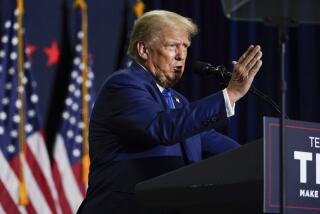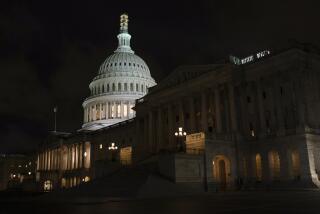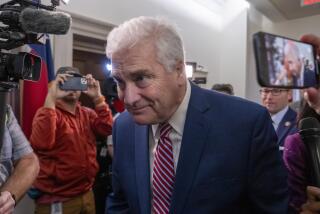Betting on Speaker’s Post, Gephardt Won’t Test Gore
- Share via
WASHINGTON — House Minority Leader Richard A. Gephardt (D-Mo.), widely viewed as Vice President Al Gore’s most formidable potential rival for the 2000 presidential nomination, plans to announce today that he will not seek the White House.
Sources close to Gephardt said two factors shaped his decision: the long odds he would face trying to best Gore and, by contrast, the seemingly favorable prospects for Democrats to regain control of the House in 2000. That shift, requiring only a loss of six seats by the GOP, would almost certainly vault Gephardt into the speakership, the post second in line to the presidency.
Gephardt’s decision, which had been anticipated by Democratic insiders, bolsters Gore’s already strong hand in the forthcoming race for the nomination.
So far, former New Jersey Sen. Bill Bradley is the only Democrat who has signaled his intention to enter the presidential competition. Other prospective contenders have dwindled to Sen. John F. Kerry of Massachusetts and Jesse Jackson.
In January, two other potential Democratic candidates, Sens. Paul Wellstone of Minnesota and Bob Kerrey of Nebraska, announced they would not run.
Gore’s apparent domination of the contest at this early stage has created unease among some Democrats, particularly Gephardt supporters. They cite a recent Los Angeles Times Poll that showed Gore trailing two possible Republican candidates, Texas Gov. George W. Bush and former Red Cross president Elizabeth Hanford Dole, in general election matchups as an indication of Gore’s vulnerability.
“There is some concern that Gore does not have a lot to say,” said one veteran Democratic operative.
Whatever the vice president’s shortcomings, even Gephardt’s partisans conceded that they would be overshadowed in Democratic primaries by the assets Gore enjoys. Like President Clinton, Gore can count on benefiting from the current prosperity and sense of well-being among Americans.
“How do you run against an incumbent vice president with the economy roaring along?” asked Bill Carrick, who managed Gephardt’s unsuccessful bid for the Democratic nomination in 1988.
Another obstacle for Gephardt was Gore’s recent success at ingratiating himself with leaders of the labor movement. Unions long have been the key part of Gephardt’s political base, given his championship of tough trade policies.
“Gephardt would still have gotten union support if he had run,” one ally said. But this source acknowledged the Missourian would have had to share some labor backing with Gore.
Other circumstances seem to have tied Gephardt more closely to the House. His successful efforts to rally his party after the 1994 midterm elections swept it from control of Congress and during the recent turmoil surrounding Clinton’s impeachment enhanced his role on Capitol Hill and heightened his self-identification as a lawmaker.
Gephardt’s attitude was underlined by his dramatic plea to his colleagues in both parties in December, following the announcement by GOP speaker-designate Bob Livingston of Louisiana that he would not assume the leadership post and would resign his House seat because of disclosures of his extramarital affairs. “The politics of slash and burn must end,” Gephardt declared in a floor speech on the day the House approved Clinton’s impeachment.
“I watched him speak out in defense of the House as an institution,” said a longtime advisor, who had been helping Gephardt prepare for another White House bid, “and I knew he wasn’t going to run for president.”
More to Read
Get the L.A. Times Politics newsletter
Deeply reported insights into legislation, politics and policy from Sacramento, Washington and beyond. In your inbox twice per week.
You may occasionally receive promotional content from the Los Angeles Times.










